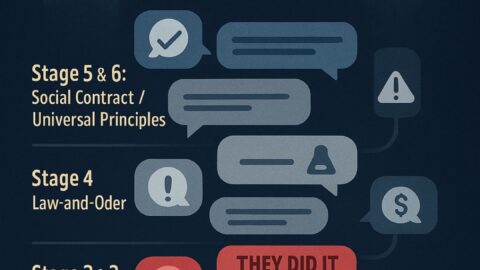to determine when your rights are being violated by Government!
When I was younger, I was told that when making a decision, a good way to evaluate the choice was to make a pro’s and con’s list. I valued this lesson, but as I have aged and matured, I realize I did my best, until I knew better and now it’s time to do better.
Back then I didn’t understand whose morality I was using when evaluating these decisions. But now I see it was based more on my own observations, experience, ignorance, immaturity and naiveté (we have all been there at least once). In essence, my own morality is not enough. I was taught to use God as a source but didn’t know how to apply it. until I got older from my own experiences as a public servant in the field of police work and elected official, along with roles in my own family as a son, brother, uncle, husband and father, as well as friendships.
It wasn’t until I was older, even in my forty’s that I finally understood the Scientific Method (I would call myself a slow learner.)1 It was understanding and applying scientific method to these roles and choices, that I understood the valuable and great insights this added to my life. By using the scientific method, I could finally make better decisions for myself and humanity, instead of the pro and con list.
Slow learner:1
- 1. Lack of Focus Makes Learning Slow
- 2. Mindset and Beliefs Have a Strong Influence on Learning
- 3. Unrealistic Expectations Make Us Believe We Are Slow Learners
- 4. Previous Learning Affects Learning Speed (I would add, previous learning can also hinder learning as well. “I never let school get in the way of my education!” — Mark Twain)
I would like to focus on mindset, morality, Scientific Method and Law.
Mindset and Being Open Minded:
In the book, “Mindset: The new psychology of success,” world-renowned psychologist Carol Dweck explains the influence our attitude can have on our growth.
“People with a fixed mindset—the belief that we are born with attributes that cannot be changed—tend to think in terms of “you either have it or you don’t,” which in turn can create a mental block that hinders their progress.
But people with a growth mindset—the belief that we can develop and improve our abilities through passion and perseverance (what Psychologist Angela Duckworth calls “grit”)—are motivated to stretch their capabilities and work harder to improve.”
I think it would be safe to say those with the growth mindset are more prone to the scientific method and law. While those with the fixed mindset, align with political law.
The Steps of Scientific Method:2
- Make an observation or observations.
- Form a hypothesis — a tentative description of what’s been observed, and make predictions based on that hypothesis.
- Test the hypothesis and predictions in an experiment that can be reproduced.
- Analyze the data and draw conclusions; accept or reject the hypothesis or modify the hypothesis if necessary.
- Reproduce the experiment until there are no discrepancies between observations and theory. “Replication of methods and results is my favorite step in the scientific method,” Moshe Pritsker, a former post-doctoral researcher at Harvard Medical School and CEO of JoVE, told Live Science. “The reproducibility of published experiments is the foundation of science. No reproducibility — no science.”
What is Scientific Law:
“Science is a systematic and logical approach to discovering how things in the universe work. It is also the body of knowledge accumulated through the discoveries about all the things in the universe.”2
“The word “science” is derived from the Latin word “scientia,” which means knowledge based on demonstrable and reproducible data, according to the Merriam-Webster dictionary. True to this definition, science aims for measurable results through testing and analysis, a process known as the scientific method. Science is based on fact, not opinion or preferences. The process of science is designed to challenge ideas through research. One important aspect of the scientific process is that it focuses only on the natural world . . . “2
“Research must involve deductive reasoning and inductive reasoning. Deductive reasoning is the process of using true premises to reach a logical true conclusion while inductive reasoning uses observations to infer an explanation for those observations.”2
“The reproducibility of published experiments is the foundation of science” and would be considered a natural law.
Scientific Law, its origins and application:
Richard J. Maybury (Whatever Happened to Justice?):3
“To understand the differences between a political legal system and a scientific one, we must know how scientific law developed. . . . feudal governments” were set up.
Hard to imagine compared with our times, but during those times, “They had little interest in the day-to-day affairs of the people. As long as the commoners paid taxes and fought in whatever wars they were ordered to fight in, their . . . governments left them alone.”
“This meant many kingdoms had no government court systems. When two individuals had a dispute, they were left to work it out on their own.”
“We can imagine what happened. Disputes often led to brawls or worse. . . when two families and friends would gather around and tell them to find some neutral third party to listen to their stories and make a decision.”
“Legal historians tell us the most highly respected and neutral third party in the community was usually a clergyman. The opponents would be brought before this clergyman, and he would listen to both sides of their story.”
“The clergyman would consult moral guidelines such as the Ten Commandments and make a decision. The grapevine would spread this decision throughout the community. It would become a precedent for later decisions. Precedent is very important.”
It was described as “case law” as it was “developed by judges, it was the beginning of scientific law.”
Interesting enough:
some of the clergymen became so skilled at listening to cases and making sound judgments that they acquired much prestige. Demand for their services grew and they became full-time judges. The body of precedents they produced became the law of common usage, the “common law.”3
Thomas Paine wrote, “Man cannot make principles, he can only discover them.”
The judges in common law (case law) were a combination of philosophers and scientists as it took time, experience and observation to discover truths.
The current Justice System by way of Attorney’s and Police Officers Use the Scientific Method and Law:
After becoming a police officer, I realized it was its own culture and language. It takes time to get used to a new job and culture. Part of this culture was stripping down a crime to its core to prove a violation took place. The core of being an investigator is the scientific method. Police officers should know this model better than most, because they know the “law“, but not the Constitution and the Bill of Rights. Its as if the concept of using the Scientific Method is compartmentalized for statues, but not used in determining if laws are against the Constitution or Bill of Rights. I would also say, the Constitution and Bill of Rights with police, attorney’s, elected official and public servants in other capacity has become trivial, a cliché as an expression that has been used so often that its meaning and impact are no longer effective, due to ignorance, misinformation and/or intentional.
The point is if the Justice System would utilize the scientific law in the Bill of Rights, they would be more in line in honoring their Oath of Office and protecting and defending every American’s Constitutional Rights. (see Is the St. George Utah Mayor, the Great Usurper? as a model of Scientific Law in action)
Another concept taught, if there is “no victim”, there is “no crime.”
The Founding Generation was highly educated:
“. . . A native of America who cannot read and write is as rare . . . as a comet or an earthquake.
It has been observed that we are all of us lawyers, divines, politicians, and philosophers. And I have good authorities to say that all candid foreigners who have passed through the country and conversed freely with all sorts of people here will allow that they have never seen so much knowledge and civility among the common people in any part of the world.
Liberty cannot be preserved without a general knowledge among the people . . . They have a right, an indisputable unalienable, indefeasible, divine right to the most dreaded kind of knowledge-I mean, of the character and conduct of their rulers.”
— John Adams
The Common Denominator
There were two fundamental laws on which all major religions and philosophies agree: (1) do all you have agreed to do, and (2) do not encroach on other persons or their property. (3) These core values and laws are contained in the Ten Commandments, the Bill of Rights and the United States and state Constitutions.
“Each religion or philosophy expresses these laws in different ways but all concur on these two laws – and not much else.”3
Encroachment: “To enter by gradual steps or stealth into the possessions or rights of another; to trespass or intrude. To gain or intrude unlawfully upon the lands, property, or authority of another.”4
According to Webster’s Dictionary 1828:
ENCROACH, verb intransitive [Eng. crook.] Primarily, to catch as with a hook. Hence,
1. To enter on the rights and possession of another; to intrude; to take possession of what belongs to another, by gradual advances into his limits or jurisdiction, and usurping a part of his rights or prerogatives; with on. The farmer who runs a fence on his neighbor’s land, and encloses a piece with his own, encroaches on his neighbor’s property. Men often encroach in this manner, on the highway. The sea is said to encroach on the land, when it wears it away gradually; and the land encroaches on the sea, when it is extended into it by alluvion. It is important to prevent one branch of government from encroaching on the jurisdiction of another.
2. To creep on gradually without right.
Superstition–a creeping and encroaching evil.
3. To pass the proper bounds, and enter on another’s rights.
Exclude th’ encroaching cattle from thy ground.
Morality:
When two people come together to form an agreement or terms of boundaries or limitations in any form of a relationship. What moral foundation or definition are they going to use? If they are left to the whims of their own opinions, their negotiations can be hampered, halted, or even gridlocked as they don’t have any common ground for any arrangement, contract, compromise or deal. This miscommunication and misunderstanding can cause frustration, contempt and anger to the point of disconnect, discontent or hatred for other the other party and even humanity.
According to Webster’s Dictionary 1828:
MORAL’ITY, noun The doctrine or system of moral duties, or the duties of men in their social character; ethics.
The system of morality to be gathered from the writings of ancient sages, falls very short of that delivered in the gospel.
1. The practice of the moral duties; virtue. We often admire the politeness of men whose morality we question.
2. The quality of an action which renders it good; the conformity of an act to the divine law, or to the principles of rectitude. This conformity implies that the act must be performed by a free agent, and from a motive of obedience to the divine will. This is the strict theological and scriptural sense of morality But we often apply the word to actions which accord with justice and human laws, without reference to the motives form which they proceed.
“America was founded foremost on the belief that there is a Higher Authority than any human authority and a Higher Law than any human law.”3
“Our political way of life is by the Laws of Nature and of Nature’s God, and of course presupposes the existence of God, the moral ruler of the universe, and a rule of right and wrong, of just and unjust, binding upon man, preceding all institutions of human society and government.”
— John Quincy Adams
I have come to the same conclusion:
“Reading, reflection, and time have convinced me that the interests of society require the observation of those moral precepts only in which all religions agree, for all forbid us to murder, steal, plunder, or bear false witness.” — Thomas Jefferson
The Scientific and Natural Law are in the Bill of Rights, Ten Commandments, the Constitution and government as they contain higher morality:
By teaching the future generations the scientific method, we are teaching them how to problem solve and even how to think by using deductive and inductive reasoning.
“We should be teaching our children the scientific method and the Bill of Rights.”5
— Carl Sagan & Ann Druyan
George Washington says the same thing on how teaching “science of government” should be our “primary” objective in educating “our youth“:
“A primary object should be the education of our youth in the science of government. In a republic, what species of knowledge can be equally important? And what duty more pressing than communicating it to those who are to be the future guardians of the liberties of the country?”
— George Washington
John Adams tells it is his “duty to study” the “science of government“, even “more than all other sciences“:
“The science of government it is my duty to study, more than all other sciences; the arts of legislation and administration and negotiation ought to take the place of, indeed exclude, in a manner, all other arts . . .”
— John Adams
In the article, Is the St. George Utah Mayor, the Great Usurper? We used the scientific method in deductive and inductive reasoning, and stripped down the problem to show how the mayor violated her Oath of Office in several areas and asked officers in attendance to violate their Oath of Office as well. The Bill of Rights was used as the backdrop and moral foundation as what government cannot do. This is an example and model of how to simplify, austere and restrain government from harming American rights as we teach our “children” and Americans “the scientific method and the Bill of Rights“, as we improve our arguments against tyranny and usurpers.
“The reproducibility of published experiments is the foundation of science. No reproducibility — no science.”
— Moshe Pritsker
This is why studying and understanding history of mankind is so critical and crucial as we are able to see patterns, copies, reproductions and replication by comparing personalities, traits, attitudes, and mindsets from history of politicians, kings and queens and in general, humans against humanity.
We can see how and when certain Laws of nature were and are violated by comparing actions and behavior layered and across all timelines as it continues to reproduce the same results of tyranny and usurpers. Those set of laws of nature are set in stone in the Bill of Rights (other documents in time as well, Genealogy of the Constitution, 10 Commandments) and cannot be defiled:
- Religion
- Speech
- Press
- Assemble
- Petition of government
- Well regulated militia
- Right of people to keep and bear arms
- Secure in their person
- Secure in their houses
- Secure in their papers
- Warrants
- Not to be compelled to be a witness against oneself
- Due process
- Speedy and public trial
- Jury by peers
- No excessive bail
- No cruel and unusual punishment
- If other rights are discovered, they are not to be denied and are to be retained by the people
- There are certain powers delegate (6) to the Federal/Central government, they are not to be violated. All other powers are reserved to the states and the people.
“If you want to make a difference, the next time you see someone being cruel to another human being, take it personally. Take it personally because it is personal.”
— Brene Brown
Anyone being a tyrant, or a usurper whether at work, in the home or in the political arena are being cruel, we need to take it personally and stand-up against them for ourselves, family, friends and countrymen along with the future posterity.
Let us remember to:
“Surround yourself with people who fight for you in rooms you aren’t in.”
There are some who cultivate big picture mindset, who recognize the links between specific actions of government against the backdrop of our country, is the Constitution (contract to not violate) and the Bill of Rights. We need our elected officials and police officers to restore our countries values to the present and future generation. We need them to see the big picture and become patriots. We all need to be thankful, including public servants for the patriots “who fight for you in rooms you aren’t in.” They have the big picture mindset.
“Patriotism is supporting your country all the time and your government when it deserves it.”
— Mark Twain
We need patriotic police officers, and legislators in city, county, state and Federal level loyal to the Constitution, the law of the land to stand up against those other public servants, who don’t stand up for the country. Otherwise, these little transitory moves together will bring America, and our children and grandchildren toward totalitarianism and tyranny.
“Patriotism means to stand by the country. It does not mean to stand by the president or any other public official, save exactly to the degree in which he himself stands by the country. It is patriotic to support him insofar as he efficiently serves the country. It is unpatriotic not to oppose him to the exact extent that by inefficiency or otherwise he fails in his duty to stand by the country. In either event, it is unpatriotic not to tell the truth, whether about the president or anyone else.”
— Theodore Roosevelt
We all need to understand this mindset, that the Patriots don’t hate those in front of them when they are addressing tyrannical issues and people by using the scientific method to determine “reproducibility” of outcomes. We all need to see the big picture and get into this mindset and be thankful for those fighting for us in rooms we “aren’t in” due to our level of understanding of right and wrong from the moral perspective of the Constitution, Bill of Rights and our God given duties and responsibilities to one another, especially when it comes by way of government (the servant) to the people (the masters).
“The true warrior fights not because he hates the one in front of him, but because he loves those behind him.”
Our elected officials, public employees and police officers need to understand this mindset as well, as they take it personally that we are fighting them, when we are championing the American ideology and cause of freedom and liberty for all Americans, including themselves and their family. They shouldn’t get mad, angry, or defensive, they should take that long eternal look and stand up for freedom, not to protect their jobs or do it for money as it will be part of selling out their birthright for a mess a pottage.
Jonathan Mayhew pointed out in 1750, that “a king’s authority is legitimate when the king obeys Higher Law, but when the king . . . turns tyrant and makes his subjects his prey to devour and to destroy instead of his charge to defend and cherish, we are bound to throw of our allegiance to him and to resist. . . . We may safely assert . . . that no civil rulers are to be obeyed when they enjoin things that are inconsistent with the commands of God. . . . All commands running counter to the declared will of the supreme legislator of heaven and earth, are null and void; and therefore disobedience to them is a duty, not a crime.”3
(1) 4 Reasons Why You May Be A Slow Learner
(2) Science and the scientific method: Definitions and examples
(3) Whatever Happened to Justice? by Richard J. Maybury
(4) Blacks Law Dictionary, 5th Edition
(5) Real Patriots Ask Questions, Parade Magazine, Sept. 8, 1991







